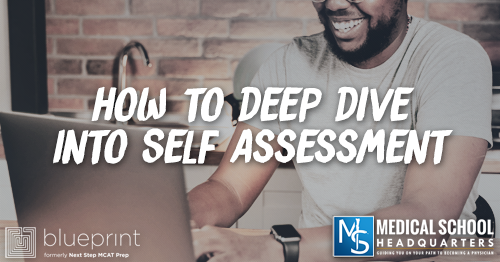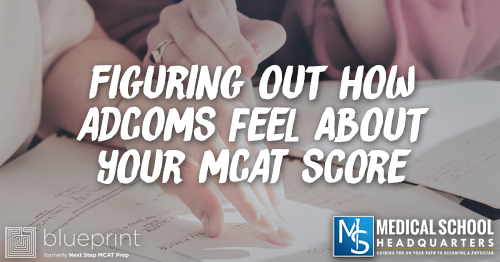Apple Podcasts | Google Podcasts
Session 246
Do you know what’s actually on the MCAT? Today, I’m joined by Ali from Blueprint MCAT to break down each section and discuss how you should prepare for each.
We are in our MCAT 101 series. Last week, we talked about courses that you should think about taking before taking the MCAT, This week, we’re going to talk about some MCAT basics – what’s on the MCAT and what the sections look like. If you would like to follow along on YouTube, go to premed.tv.
Listen to this podcast episode with the player above, or keep reading for the highlights and takeaway points.
[04:06] What is the MCAT?
To a lot of students, they think the MCAT is just another test. They think they have good grades and they’re good test-takers, therefore, they should do well on the MCAT.
'The MCAT is just a test you need to take into medical school. You shouldn't be surprised by it. You should prepare for it way ahead of time.'Click To TweetThe MCAT is a seven-and-a-half-hour test. Its format changed a lot over the years going from eight and a half hours and then it went down to three to four hours. And now we’re back up to seven and a half hours.
[05:41] The 4 Sections of the MCAT
There are four sections on the MCAT, three of them are sciences:
- Chem/Phys (Chemical and Physical Foundations of Biological Systems)
- CARS – Critical Analysis and Reasoning Skills
- Bio/Biochem (Biological and Biochemical Foundations of Biological System)
- Psychology and Sociology
The MCAT is a passage-based test that means in each section you will see passages you have to read before you can answer four to seven questions.
Section I, III, & IV: The Sciences
Section I (Chem/Phys) has 59 questions and you have 95 minutes to answer. 15 of these questions are called discrete which means they are not passage-based. These tend to be Skill 1 or Skill 2 questions based on your content knowledge. The other 44 questions are distributed over 10 passages with four to six questions in each passage.
The same thing can be said about Bio/Biochem (Section III) and Psych/Soc (Section IV).
Section II: CARS
This section is only about critical reasoning and you will not see discrete questions. It has 53 questions, and you will have 90 minutes to answer these questions. These questions are distributed over nine passages. So you will have an average of close to six questions per passage where the distribution is five to seven questions per passage.
[09:04] Changes Due to COVID
There’s no way of knowing what the AAMC is planning as they tend to keep everything secret. And if you’re planning to take the MCAT in the next couple of years, there’s no news on shortening the MCAT.
Initially, they wanted to do three MCATs per day, that’s part of the reason they shortened it. Then they went into two MCATs per day, just so they can have less students in each administration. And there’s more social distancing within the rooms.
Now, hopefully, COVID is not going to resurge back in the fall. So far, the plan is to keep it as just the full-length MCAT and the 3 pm MCAT is gone for now.
[10:54] Administering the Test at Home
Ali thinks the reason the AAMC has not yet switched to testing at home, which is something other tests have adopted, is because I think it’s something to adjust to. Obviously, you need to practice with this setting, taking your tests, land picking a spot in your house, where you will always take it.
It’s something to adjust to where you’re watched with a webcam instead of going to a testing site.
This would have been safer to take it at home in the middle of a pandemic. That being said, the AAMC is also taking a lot of precautions to make sure they maintain social distancing and that everybody’s wearing a mask.
[11:30] The CARS Section
'The data from the last 10 years show that students who do better on CARS tend to get into medical schools.'Click To TweetAli presents this interesting data that students with very low CARS scores tend not to go into medical school. The average CARS score for admission tends to be as high or even higher than the sciences, especially if you’re aiming to go into a top school. So it’s not a section to ignore and it’s not a section that’s less important. It is as important, if not, more important than the remaining sections of the MCAT.
Ali adds that the CARS section requires a lot of preparation. This is the one section where you cannot power through on the strength of your content. There are a lot of students who didn’t practice enough, but they know enough content. And so, they get a decent enough score on some of the science sections. But you cannot do this on course.
Hence, you want to start prepping for CARS on a weekly and daily basis months before you take your MCAT. There should also be some point of focus from you.
[13:15] Better CARS, Better Sciences
'The skills you build and learning how to beat the CARS section translate into the sciences.'Click To TweetThe CARS is a pure critical thinking section, whereas the sciences are a combination of content and critical thinking.
Ali has seen that as his students improve on the CARS section, their science scores are also going up. They do better on problem-solving questions and passage-based questions on the sciences compared to what they’ve done when their CARS scores were low.
Hence, CARS is a very important section. It’s not science-based. But the skills you build for the CARS section will help you do better in the sciences.
[14:26] Preparing for CARS
Ali reveals that he hears from a lot of students saying that reading a book every week does not translate into doing well on the CARS section.
“If you're reading outside of practicing for CARS to get your skills better, read argument-based passages instead of reading a novel.” Click To TweetRead articles from a book review because it has an audience argument. The author is writing it for a purpose. And when you’re reading, do not be passively reading but be actively reading the article. Whether it is a book review or an argument-based article, evaluate the arguments.
Engage with the material you’re reading with what the author is saying. And go deeper into why is the author saying this and how does it fit with the other elements of the material you’re reading.
[17:00] 3 Categories of Passage-Based Questions
To help you better understand, Ali breaks down passage questions into three general categories.
Category 1 – These are what you expect from passage questions.
These are passive analysis questions where you want to understand the experiment, the equation, and the figure in order to answer these questions. These tend to be Skill 2, Skill 3, or Skill 4 questions. And so, for these questions, you need to understand the passage.
Category 2 – You need information in the passage. But you don’t have to understand the passage to answer the question.
For example, “we used a visible light laser in the experiment.” And then the question will ask you, what could be the wavelength of the laser they used? So what’s being tested here is your ability to know the wavelength for visible lights. And so, nothing in the passage will help you answer the question, except knowing that they mentioned visible light in the passage.
Category 3 – You don’t need the passage at all.
The question is within the topic of the passage, but no information in the passage is needed to answer these questions. And so, these tend to be content questions.
[20:23] The MCAT is Not a Content Test
The MCAT does overlap with your undergraduate classes so the contents in here should be familiar if you’ve taken these classes, but with two very big key differences.
1. The MCAT is a mile-wide and an inch deep.
The MCAT will not test you on content to the level of depth that you’ve seen it in your undergraduate classes, especially for something like organic chemistry where you had one small clue and you had to build a whole mechanism out of it. That’s not going to test it this way. It’s multiple-choice stuff.
2. It’s a problem-solving test, not content.
There are a lot of content-based questions but the majority of questions are problem-solving questions.
Actually, AAMC says explicitly, 45% of our questions are problem-solving questions, and 20% of our questions are research design and figures questions. Then 65% of your science questions are application questions and not recall questions.
At the end of the day, you need to practice for the MCAT and not be satisfied with knowing your content from undergrad or from a test prep book.
'It's not a content test. It's a critical thinking test that just happens to be based on science.'Click To TweetLinks:
SEARCH SITE
SEARCH SITE
LISTEN FOR FREE












